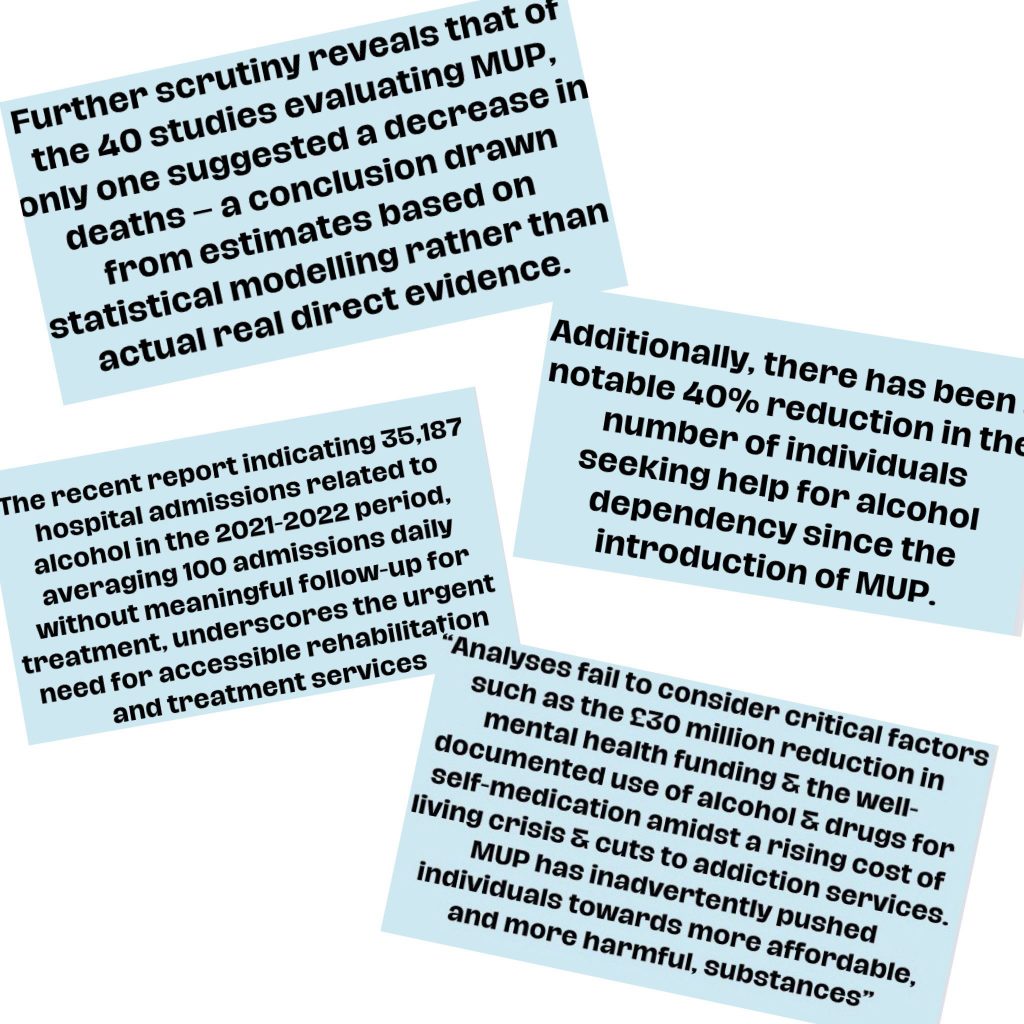It’s not to late you can write to local MSP & Councillors here https://writetothem.com Use this as a template
”
Dear [MP’s Name], I write to express my concerns regarding the outcomes of the Minimum Unit Pricing (MUP) policy on alcohol in Scotland. Despite the Scottish Government’s assertions that MUP has contributed to a reduction in hospital admissions and alcohol-related deaths, recent data indicates a troubling trend. Alcohol-related fatalities have reached a 14-year high, with 1,267 deaths reported last year.
This alarming figure raises questions about the efficacy of MUP in achieving its intended public health outcomes. Further scrutiny reveals that of the 40 studies evaluating MUP, only one suggested a decrease in deaths – a conclusion drawn from estimates based on statistical modelling rather than actual real direct evidence. When comparisons are drawn with regions such as Northern Ireland, rather than England, the data suggests that MUP has not have the positive impact on mortality rates as previously claimed. Additionally, there has been a notable 40% reduction in the number of individuals seeking help for alcohol dependency since the introduction of MUP.
Public Health Scotland’s own data indicates that those most affected by alcohol dependence, are harmed further and exacerbated by MUP, and are forgoing essential needs such as food. This highlights a critical oversight in the policy’s impact on vulnerable populations. The recent report indicating 35,187 hospital admissions related to alcohol in the 2021-2022 period, averaging 100 admissions daily without meaningful follow-up for treatment, underscores the urgent need for accessible rehabilitation and treatment services.
The current situation suggests that while MUP aimed to reduce alcohol consumption among dependent individuals, it does not address the root issues of addiction and its broader societal impacts. The evidence points towards an increasing need for comprehensive support and treatment services, which should be readily accessible to all, irrespective of their postcode. If the goal of MUP is to fund these essential services, we must ensure that the increased pricing genuinely translates into enhanced treatment and rehabilitation opportunities. In light of these findings, I urge a reevaluation of the current strategy surrounding alcohol pricing and treatment services. It is paramount that we adopt an approach that not only aims to reduce consumption but also provides a robust support system for those struggling with alcohol dependency.
Thank you for considering these critical issues. I look forward to your response and to seeing meaningful action taken in response to this pressing public health concern. Yours sincerely, [Your Name]
You could also use any part of anything written below to add weight to your request. And see more written here also
See also letter below sent to the Scottish Information Commissioner on 8/2/24
Request for Intervention: Evaluating the Continuation of MUP by the Scottish Government Amid Rising Alcohol-Specific Deaths.
@FOIScotland Good morning I would like to ask the Scottish Information Commissioner to consider launching an intervention into the Scottish Government’s decision to continue MUP beyond 30th April 2024: “On balance, the Scottish Government considers that MUP delivers public health benefits proportionate to the potential impacts of the policy on business, industry and the alcoholic drinks market. The Scottish Government is therefore proposing that MUP is continued beyond 30 April 2024.” Health secretary, Michael Matheson, is due to update Holyrood today on the Scottish Government’s plans to continue MUP, this is despite alcohol specific deaths increasing by 140 since MUP was introduced in 2018. Alcohol specific deaths are now at the highest level in 11 years, according to figures published by the National Records of Scotland (NRS). In the exact same way as your recent intervention in relation to the use and retention of informal communications using tools such as WhatsApp, the public need to understand how the decision to continue MUP was reached, this is the only way to maintain public confidence. Understanding how decisions are reached is how public trust in decisions are secured.
SOURCE – Figures published by NRS Table 1: Alcohol specific deaths Deaths which are known to be direct consequence of alcohol: 2012- 968 2013- 1002 2014- 1036 2015- 1045 2016- 1139 2017- 1120 2018- 1136 2019- 1020 2020- 1190 2021- 1245 2022- 1276 Thank you for your attention on this matter. Sincerely, Annemarie Ward CEO, Faces & Voices of Recovery UK
Update Friday 9th February 2024
In September, if ministers vote it through Scotland will see an increase in the price of alcoholic beverages, following the government’s decision to raise the minimum unit price (MUP) of alcohol from 50p to 65p. This move is an extension of a policy hailed by Scottish ministers as a “world-leading” effort to curb the country’s alarming rates of alcohol-related deaths.
However, the reality of this policy’s impact paints a markedly different picture, one that calls into question its efficacy and the rationale for its continued enforcement and also if one care to look deeper a call to question the many government quangos that support their political paymasters.
The MUP policy was introduced with great enthusiasm across various sectors of Scottish civic society, including a broad swath of the political spectrum. Initially proposed by the SNP in its 2011 manifesto. Yet, despite the high hopes pinned on MUP, the sobering statistics tell a different story: alcohol-related deaths in Scotland have surged to their highest level since 2008, undermining the policy’s purported success.
The decision to implement MUP was undoubtedly bold it was even subject to a sunset clause, allowing for the policy’s termination should it fail to meet its objectives. However, recent developments and the government’s determination to increase the unit price in the face of mounting evidence to the contrary suggest a disconnect from the policy’s real-world outcomes.
On June 27, 2023, the Scottish Government released a press statement asserting that the Minimum Unit Pricing (MUP) policy has been beneficial in saving lives, decreasing the number of hospital admissions, and positively impacting health. This assertion was reportedly based on a comprehensive and independent assessment, supported by a vast array of evidence from 40 separate research studies.
The statement highlighted a specific analysis conducted by Public Health Scotland (PHS) and the University of Glasgow, which found that MUP had led to a 3% reduction in alcohol consumption, a 13.4% drop in deaths directly linked to alcohol, and a 4.1% decrease in hospital admissions, relative to scenarios without MUP implementation.
However, a closer examination reveals that the overarching conclusion did not stem from the totality of the 40 studies cited in the so-called “final report.” In fact, 32 of these studies did not touch upon health outcomes, instead focusing on consumption patterns and other secondary issues.
Out of the eight studies that did delve into health outcomes, the majority, seven to be exact, produced inconclusive results. Only the study conducted by PHS and the University of Glasgow, which was specifically mentioned in the press release and led by PHS’s public health advisor Grant MA Wyper, affirmed a reduction in mortality rates due to MUP.
It’s critical to note that the “final report” seemingly reiterates the findings from the PHS and University of Glasgow study without presenting new evidence. Moreover, the independence of this study is questionable as it was commissioned by PHS and led by one of its advisors. This study, along with its conclusions, had already been disclosed in a previous report published in The Lancet.
Presented as separate findings in the most recent PHS “final report,” these studies—cited as Wyper et al (2023a) and Wyper et al (2023b)—do not expand upon the original Wyper study. Thus, the claim that MUP has significantly cut down deaths lacks a broad base of independent and conclusive evidence, relying instead on a singular report by PHS.
Furthermore, the assertion regarding a 4.1% reduction in hospital admissions lacks statistical significance, casting doubt on the Scottish Government’s ability to categorically state the effectiveness of MUP in reducing hospital admissions by this margin.
Critiques of the policy have highlighted its failure to significantly impact the target group—those drinking at harmful levels. Public Health Scotland’s analysis found “no clear evidence” that MUP has led to a reduction in alcohol consumption or altered the severity of alcohol dependence among this demographic. This is particularly troubling, as the justification for MUP largely rested on its potential to mitigate harm among problem drinkers, without unduly affecting moderate drinkers.
The economic repercussions for vulnerable families, a concern raised during the policy’s initial debates, have materialized as feared. The financial strain on households with alcohol-dependent members has intensified, exacerbating the challenges faced by already economically disadvantaged groups. Moreover, the policy has not achieved tangible reductions in alcohol-related emergency department visits, ambulance callouts, or crime rates.
The government’s defense of MUP, particularly Deputy First Minister Shona Robison’s claims of the policy saving “hundreds of lives,” rests on speculative models rather than concrete outcomes. This hypothetical framing contrasts sharply with the tangible increase in alcohol-related deaths, presenting a paradoxical narrative of success amid clear signs of failure.
Furthermore, the broader research landscape, including a comprehensive evaluation by Public Health Scotland and a study published in The Lancet, reveals significant uncertainty and inconclusiveness regarding MUP’s health impact. The reliance on a singular study to support claims of reduced deaths and hospital admissions contrasts with a plethora of evidence indicating the policy’s negligible or non-significant effects on public health outcomes.
The persistence of alcohol-related mortality and morbidity, despite MUP, underscores the need for a critical reassessment of the policy’s effectiveness. Rather than doubling down on an approach with questionable benefits, it is imperative for policymakers to explore alternative strategies that address the root causes of alcohol abuse without imposing undue burdens on the population. The insistence on a failed policy not only misallocates resources but also overlooks the complex socio-economic factors contributing to Scotland’s alcohol crisis.
The “final report” at a glance
The at a glance conclusion states:
“Overall, the evidence supports that MUP has had a positive impact on health outcomes, including alcohol-related health inequalities.”
However, the finding for health above states:
“MUP reduced deaths directly caused by alcohol consumption by 13.4% and hospital admissions by 4.1%.
“Reductions were greatest for men and those living in the most deprived areas of Scotland.
“There is no consistent evidence of impact, positive or negative, on other health outcomes.”
This is not “overall” evidence. It’s a single study.
The conclusion should have stated:
“One study supports that MUP has had a positive impact on deaths and there is no consistent evidence of impact, positive or negative, on other health outcomes.”
Criticisms of the Lancet study
Dr Adam Jacobs, Senior Director, Biostatistical Sciences at Premier Research, challenged the methodology behind the 13.4 per cent increase.
He said: “It is plausible that the MUP policy would bring down deaths and hospitalisations due to alcohol consumption, but I don’t think this paper shows it convincingly.”
Prof Kevin McConway, Emeritus Professor of Applied Statistics, The Open University, rightly took issue with the “causal interpretation” in The Lancet study.
He said: “This is an observational study, and no matter how well other factors are controlled for, it can never prove conclusively that the changes observed in deaths were due to the minimum unit pricing policy. In my view there hasn’t been enough caution given around assuming this relationship is causal…”
“We can’t say that MUP definitely led to a 13.4% reduction in deaths, though that does clearly remain an important possibility…”
“While it’s possible that the deaths or hospitalisations would have decreased enough to be detectable in the follow-up period here of 32 months after MUP, it’s also possible…that they aren’t clearly detectable on that time scale, though (if they really exist) the effect should show up, and indeed be much larger, later. And given what the time lag specifications look like in the Holmes paper, in another 7 or 8 years the reductions in deaths would be immense, implausibly immense indeed, given the size of the estimate after just over 2.5 years.
“Or it’s possible that what is being picked up in the new study is an effect of a change in alcohol consumption that occurred considerably earlier than MUP, so couldn’t have been caused directly by MUP…”
“So overall, in my view, there remains some doubt about whether MUP definitely caused the alcohol consumption change and therefore whether it is responsible for reductions in deaths.”
This single study, led by none other than a PHS adviser (because who needs outsiders when you can assess your own policies, right?), becomes the linchpin of the Scottish government’s argument. Despite the air of independence and the array of cited studies, it turns out we’re mostly just rehashing findings from one source. And to add a cherry on top, the celebrated reduction in hospital admissions? Statistically insignificant.
So, there you have it, folks. According to the Scottish Government, thanks to MUP, we’re outperforming even the most imaginative parallel universes in health outcomes. Never mind the pesky details like the majority of evidence being inconclusive or the fact that most of this grand conclusion rests on a singular, possibly biased study. Cheers to the magic of selective reporting!
The stance of all the Scottish Government quangos on Minimum Unit Pricing #MUP follows the official party line. However, their analyses fail to consider critical factors such as the £30M reduction in mental health funding and the well-documented use of alcohol and drugs for self-medication amidst a rising cost of living crisis and cuts to addiction services. Importantly, their evaluations also neglect the crucial aspect of poly-drug use, the migration towards inexpensive alternatives like 20p street valium, and the increasing use of synthetic opioids. These elements are pivotal in understanding the full impact of substance use trends, particularly in the context of MUP.
The omission of these factors from their analysis is significant. It overlooks the reality that MUP has inadvertently pushed individuals towards more affordable, and more harmful, substances. This shift is a critical consideration in the debate on MUP’s effectiveness and its unintended consequences. The true solution to reducing alcohol-related deaths lies in substantial investments in comprehensive recovery programs.
Initiatives like MUP and Drug Consumption Rooms (DCRs), can claim to be world leading & on the surface seemingly progressive, but in actual fact distract from addressing the root causes’s of substance use.
The situation suggests a concerning level of oversight or perhaps a willful ignorance by policymakers and their supporting actors in the sector, leading to policies that do not fully address, and even exacerbate, the complexities of addiction.
Scotland has a army of Scottish government funded policy actor organisations who both wag the government tail with their chosen ideologies and obediently clap like seals when asked.
I firmly believe that the implementation of #MUP is having detrimental effects, leading to fatalities. However, I lack the extensive support of paid policy advocates to corroborate this stance. Despite this, it is widely acknowledged among the general populace that this policy is indeed causing harm. The failure to consider the broader picture, including poly-drug use and the turn to cheaper substances, underscores the need for a more nuanced, intelligent, less politicised and more informed approach to alcohol & other drug policy.
In conclusion, the continued pursuit of MUP, in light of its demonstrated shortcomings, represents a missed opportunity to genuinely improve public health and address alcohol-related harm in Scotland. The evidence—or lack thereof—calls for a candid evaluation of MUP’s place in Scotland’s public health strategy and a willingness to pivot towards more effective, evidence-based interventions.
Annemarie Ward
More articles can be found here
https://snowdon.substack.com/p/minimum-pricing-maximum-gaslighting
https://www.telegraph.co.uk/news/2024/02/09/snps-war-on-booze-bound-to-fail/
and here
and here
https://thecritic.co.uk/minimum-pricing-miserable-results/
and here
https://snowdon.substack.com/p/the-minimum-pricing-salvage-job
https://www.thetimes.co.uk/article/minimum-pricing-for-alcohol-has-increased-drug-use-l83q6tf70
There’s a terrible denial at the top that Minimum Unit Pricing (MUP) does not lead individuals to substitute alcohol for cheap drugs. #NoToMUP#MUP A study accessible at
@CaledonianNews#WeAreGCUGlasgow research portal sheds light on this very issue, suggesting that the consequences of MUP might be more complex than previously acknowledged, particularly among vulnerable populations such as those experiencing homelessness. https://researchonline.gcu.ac.uk/en/publications/alcohol-minimum-unit-pricing-and-people-experiencing-homelessness…
Just incase these links are removed here it is also
This discussion unfolds against the backdrop of the Scottish Government’s formidable communication arm, reportedly employing 175 staff members dedicated to communication and reporting. This figure significantly overshadows the BBC’s 34, highlighting a potent and well-funded machine operating at the taxpayers’ expense. The ratio of independent journalists to government communication staff in Scotland paints a stark picture: for every independent journalist, there are six government staff members, suggesting a significant tilt in the balance of informational power. Conversations with journalists reveal a concerning trend, with many noting that their peers have transitioned to roles within the Scottish Government’s communications teams, colloquially referred to as “going over to the dark side.” https://spectator.co.uk/article/nicola-sturgeons-secret-state… The implications of this infrastructure are profound, not only under the current administration but for the future as well. The concern is that regardless of any potential governmental change, the succeeding parties might inherit and possibly sustain this expansive network of quangos and communication roles, perpetuating a cycle that may further challenge the landscape of independent journalism and public discourse in Scotland. This situation invites a sober reflection on the dynamics of government communication, the independence of the press, and the broader implications for democratic engagement and transparency. While the findings and the current communication structure might seem disheartening, they underscore the importance of critical scrutiny and the need for a vigilant, informed public dialogue.
Sorry to be so depressing !


